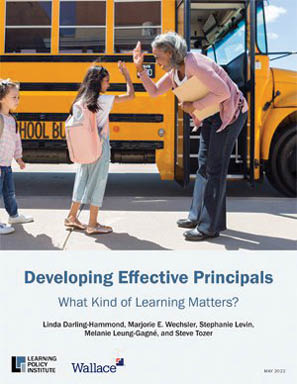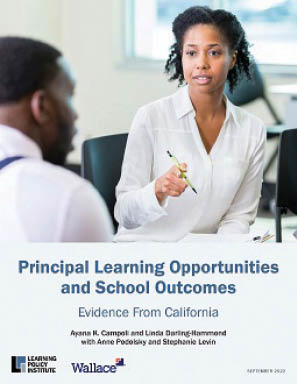Principal Preparation Matters

Great principals can improve outcomes for students, teachers, and schools, but they don’t grow on trees. Strong development from pre-service preparation to on-the-job support is critical to developing principals who thrive.
What does high-quality principal development look like? A report from the Learning Policy Institute, “Developing Effective Principals: What Kind of Learning Matters?” answers this question and more. The research team, led by Linda Darling-Hammond, synthesized two decades of research on principal pre-service preparation and professional development to identify common elements of high-quality programs, assess gaps in access to learning opportunities, and identify state policy changes that could help bolster principal development. Principal Leadership spoke with Marjorie Wechsler, principal research manager at Learning Policy Institute and a co-author of the report, to discuss principal preparation and support in the face of an ever-changing role.
Principal Leadership: What types of learning experiences have the most positive impact on principals or aspiring principals?
Wechsler: We found that there are two important aspects when thinking about principal learning. One is the content. What principals learn matters. They need to learn things such as instructional leadership. They need to learn how to improve schools by using a variety of data to inform their decisions. They need to learn how to establish positive school conditions by creating collaborative work environments for teachers and working with families and community stakeholders. They need to learn about staff development and how to help teachers improve their practice. And they need to learn how to meet the needs of all learners. So, one bucket of work of principal learning is what they’re learning.
But we also determined that how principles learn matters a lot. In principals’ pre-service preparation, applied learning opportunities—such as inquiry projects based on real schools—are important. Internships where pre-service principals can take on the responsibilities of a school leader under an expert principal are critical. Having expert coaches or expert mentors who can provide support and guidance contributes in important ways to principal learning, as does engaging in cohorts or networks where groups of new or veteran principals can learn together and share their stories, their experiences, their challenges, and their successes. The principalship shouldn’t be such an isolating experience, because principals only grow and develop—and help others grow and develop—when they can do so with others.
Principal Leadership: What are the differences between what new principals need versus veteran principals in terms of development and support? And what role can veteran principals play in supporting their peers?
Wechsler: New principals are still learning, so having that coaching is critical. And I’m not talking about having someone tell them what to do but having someone help them think through the challenges they’re facing so that the novice principals can learn to become problem solvers. Veteran principals can play that coaching support role that novice principals really need. They can also provide some of the emotional support to get through the challenges ahead.
But the research showed us that veteran principals also need a lot of support. The role of the principal has really changed over time. It used to focus on tasks like creating the master schedule or managing the budget. Those things are still important, but the role also now includes skills such as instructional leadership, community outreach, and staff development. When we surveyed principals at all levels of experience, we found that most principals wanted a lot more professional development on all topics.
Principal Leadership: The responses to our recent surveys of principals have underscored the challenges principals have faced over the last several years, from the pandemic to political polarization, that have some reconsidering their future in the profession. How can principal preparation play a role in retention?
Wechsler: Research has shown that principal preparation and professional development can improve principals’ sense of efficacy and satisfaction and, in turn, improve retention. Access to high-quality preparation, internships, and mentoring significantly reduces the likelihood that principals will leave their schools or the profession. Programs that carefully select and prepare principals for challenging schools, and that work with school districts to support and develop principals in those schools, are likely to produce principals who stay.
Nearly all principals, novice and experienced, indicated a desire for professional development to meet their students’ needs. However, many principals face obstacles to professional learning opportunities, including a lack of time and lack of money. Districts can provide support that frees principals’ time, offer professional development at times and locations that are convenient for principals, and embed professional learning into districts’ feedback, evaluation, and mentoring systems.
I want to note that some of my colleagues’ research shows that strong principal preparation matters to other school outcomes such as teacher retention. A study by Darling-Hammond and Ayana Campoli called “Principal Learning Opportunities and School Outcomes: Evidence from California” included detailed surveys of a representative sample of principals across California that they were able to link to administrative data from approximately 14,000 teachers and 314,000 students. They found a strong connection between principals’ overall preparation quality and teacher retention. There was a significantly higher likelihood of teacher retention when principals were specifically prepared for the tasks of developing people. This suggests that principals who know how to support teachers retain them.
Principal Leadership: How can a focus on equity-oriented leadership in principal development help principals better meet the needs of diverse learners?
Wechsler: There is an emerging focus in the research literature on preparing leaders to serve diverse populations of students. This small-but-growing research base shows that engagement in applied learning opportunities such as action research projects or reflective activities such as cross-cultural interviews, can lead to growth in principals’ awareness of how to meet the needs of diverse learners. Having these experiences can help them better understand the policies and practices that have led to systemic inequities, and through these activities, they can develop a sense of responsibility and understanding of how to change those inequities.
Principal Leadership: What role do partnerships play in principal development? What can districts do to develop strong partnerships that result in more effective principals?
Wechsler: The partnerships between preparation programs and districts are critical. One of the most obvious roles for districts to play is providing residencies and internships, which are important for preparing novice principals. Beyond those opportunities, strong partnerships can ensure everyone is working toward common goals. For example, the local districts can communicate their needs to the university preparation programs; they can share where their principals are doing well and where they’re struggling, so that there can be alignment between the needs of the districts and what the universities are providing. In turn, the universities can share with districts the more recent research they’ve been doing or learning from.
We’ve seen examples where both the district office and the universities have formal liaisons and where there are regular meetings focused on principal development. Having a formalized partnership with people responsible on both ends helps move the work forward in a coherent manner.
We also have examples where districts will cover the cost of the residency for pre-service principals, which opens up the principalship to a wider group of people—not just those who can afford to enroll in a principal preparation program.
Principal Leadership: How can an organization like NASSP support and advocate for improved principal preparation?
Wechsler: I think NASSP is already doing a lot of this work. It’s really important to bring the voices of the practicing principals into the preparation programs. Their stories are extremely powerful—where and why they’ve been able to succeed and where and why they’re facing challenges.
NASSP also shares research in Principal Leadership and makes sure that it gets into the hands of preparation programs and even policymakers who have a role in preparation through leadership standards, program standards, and licensure requirements. And I think NASSP can bring members’ ideas to the table about how we can continue to strengthen principal learning opportunities from preparation through induction and ongoing professional development.
Principal Leadership: Is there anything else about principal preparation or the report that you’d like to mention?
Wechsler: We talked about equitably serving all students, but principal development itself is an equity issue. We found that access to high-quality learning opportunities varies by school poverty level, which we know tends to reflect the racial demographics of a school. Principals in low-poverty schools were much more likely than principals in high-poverty schools to report that they had learning opportunities in a number of those content areas that are associated with effective leadership. And they’re more likely to experience problem-based learning and cohort-based learning. We must not only improve the quality of principal learning but make sure that we’re increasing access for all principals to have those high-quality learning opportunities.
It’s going to be especially beneficial to children who are currently furthest from opportunity. Going back to the study I mentioned earlier about the effects of principal preparation on teacher retention, the researchers also found that students whose principals had more access to professional development were projected to make greater gains in both English language arts and math. These achievement gains linked to principal professional development were especially notable for historically underserved students of color. Principal learning is important on so many levels, but it is ultimately an equity issue.
Sidebar
To read the full reports, visit learningpolicyinstitute.org.


